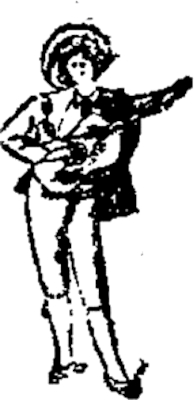This article has been transcribed from a copy of the Cardiff Times in the online collection of scanned Welsh newspapers 1804-1919 in the National Library of Wales, with grateful recognition of the free access accorded to all readers. Paragraph breaks have been introduced for easier reading.
Explanatory notes
Samuel uses only one line of Shakespeare in this article: 'enterprises of great pith and moment', from Hamlet III.i.99., but cites many contemporary popular songs. —— David Skilton

change has of late years come o’er the vision of the songster's dream, sir, and in place of the vigorous rondels written and sung in the days of our forefathers, when love meant happiness and rewards for deeds of valour, we are to-day taught that the sacred passion only leads to days of weeping and disappointment; and in the modern ballads maidens wait for lovers who are false, and youths who would be true invariably find their 'one true woman' — when it is too late.
The principal modern ballads may be divided into three heads, sir, and they are: The frivolous, the morbid, and the intensive. So far as the lyrics of the first type are concerned, they are all built on one principle; and tend to point out actual morals worthy the notice of young men and maidens. They show easily one may fall into mischief and love, and give one but a poor idea of the firmness of the fair sex under the persuasive powers of a wooer who, according to the ballads, usually tells the old, old story during the progress of 'a little summer shower' (of an hour's duration); or breathes tender words to an unsuspecting damsel whilst crossing the ferry, or when she is going home from the market. And all this invariably takes place during the summer-time. On such occasions we learn, I regret to say, that the duties upon which the maiden is engaged, are sadly neglected, and the love-whispering swains appear to be responsible for much wasted time and many unexecuted commercial and domestic commissions. Whether these idling couples continue this sort of thing when they enter upon the consummation of their love the balladists refrain from stating — perhaps they consider it unwise to raise the curtain after it has fallen at the end of their limited drama of coquetry and love.
The heroes and heroines of the morbid school of ballads are made of sterner stuff, and take a serious and earnest view of life and its duties For instance, a hero will declare his passion under the most peculiar and inconvenient conditions, and, it seems to me, often runs the risk of an attack of neuralgia or rheumatism for the mere pleasure, if pleasure it can be called, of telling the lady of his choice that he is madly in love with her. The refrain of this gentleman's story, according to the balladist (I quote from a popular song), is as follows:--
I am waiting 'neath thy casement,
And the stars are shining above me;
I am waiting just to tell thee —
Just to tell thee, dearest, that I love thee.
Now, sir, it certainly appears to me, that the lovesick swain might with advantage to himself and the lady have chosen a more fitting and opportune time for the purposes of his avowal. Not only would he run the risk of catching a cold in his head, but he would in all probability, if he declared his passion vocally (as did the troubadours of old), interfere with the lady's slumbers and disturb the watch dog and his inamorata’s father. Surely he would have been wiser to have told his tale under happier and less risky conditions. A maiden rudely awakened from her beauty sleep is scarcely likely to look with favour upon the suit of her disturber.

The old, old story.
heart, not unnaturally marries some one else. Even should this style of hero declare his passion, it is in such a way as to lead to misunderstandings, which he is too proud or too nervous to set right. He lives in the hope of a period of love and happiness in 'realms above.' His belief in the joys to be enjoyed by disappointed lovers in the world to come is extraordinary. In fact, sir, if the balladists are to be accredited the great hereafter will be one round of love and spooning — a happy hunting ground where the amorous victims of earthly circumstances will make up for lost time. All errors of earth are to be reconciled on 'the golden shore' and pairs who failed to arrange things to their liking in this world will by some unexplained process of animal magnetism come together in the next. This is somewhat how the thing is put generally. The youth or maiden loves in vain, but lays in the fluttering unction to his or her soul that
True love, unlike the flowers
That bloom to fade away,
Will live and grow hereafter,
In realms of endless day.
Death is a great factor with the morbid balladist, and disappointed lovers all die straightway, with visions of angels and thoughts of future happiness hovering around them.

Old style troubadour
Then again, sir, the morbid balladist is great on dying children, frequently of the street arab order, who, according to the ballads, all go to 'the better land,' and are treated with respect and admiration by the residents thereof. There is nothing agnostical about. the modern balladist, sir; he has the whole thing cut and dried, and knows exactly what will happen with each of his child[ren] [heroes directly they depart this life. All the children of the ballad world are weak and ailing, many of them are possessed of an unhealthy desire to join their parents at an early age, the said parents having previously gone to the 'realms of bliss.' I have observed, sir, that all the balladists of to-day give the great hereafter similar names. 'The home of bliss,' 'the golden land,' 'the great eternity,' 'the golden shore,' and 'the better land,' being the most popular. This may perhaps be accounted for from the fact that 'bliss' rhymes with 'kiss,' 'land' with 'hand' (used usually in reference to angels), and 'eternity' with anything ending with 'e' — as 'thee,' 'be,' 'sea,' 'glee.'

'I am waiting 'neath thy casement.'
Another stamp of ballad hero is the one who hoards up souvenirs of his lady-love. He collects faded flowers, locks of hair, and old gloves (invariably odd ones, and therefore of no practical use), and tells his tales of love to them. He is one of the unfortunates whose dream passes away either through the falseness or death of his fancy. What consolation is to be derived from the possession of a collection of odds and ends that once belonged to a lady whose position prevents legitimate interest in her is a thing I cannot make out. Yet, sir, the balladists convey the notion that there is a sort of sweet sadness surrounding such relics which is as efficacious in its soothing influence as a patent medicine. The lovers of the intense school are really awful beings, and their state of mind is little short of lamentable. They are in a perpetual state of yearning, and make more fuss about trifles than ordinary people would about 'enterprises of great pith and moment.' They live in a dreamland of their own, and appear to exist only for the purpose of telling each other the amount of rapture contained in a kiss or the wonderful pleasure to be obtained by waiting in peculiar places at unearthly hours with no other object than the possibility of a chance meeting with each other. The intense balladists are peculiarly alike in the fact that you can never quite make out what they mean. Whether they even know themselves is, I venture to think, open to doubt. They are also largely given to metrical conundrums, as witness the following from one of the most popular of the intense ballads of the day:—
On the grass of the cliff, at the edge of the steep,
God planted a garden — a garden of sleep,
'Neath the blue of the sky, in the green of the corn,
It is there that the regal red poppies are borne.[sic]
Brief days of desire, long dreams of delight,
They are mine when my Poppy-land cometh in sight,
In music of distance with eyes that are wet
It is there I remember, and there I forget!
O heart of my heart! Where the poppies are born,
I am waiting for thee in the hush of the corn.
In my garden of sleep, where red poppies are spread
I wait for the living alone with the dead!
For a tower in ruin stands guard o'er the deep,
At whose feet are green graves of dear women asleep.
Did they love as I love when they lived by the sea?
Did they wait as I wait for the days that may be?
Was it hope or fulfilling that entered each breast
Ere death gave release and the poppies gave rest?
O! life of my life! on the cliffs by the sea,
By the graves in the grass, I am waiting for thee!”
There is an air of vagueness about these verses that is unique, but it is a fair specimen of the intense school. The principal disciple of this style of ballad is as aesthetic and intense as the songs he sings, and he has been duly adored by languishing maidens in West-end drawing-rooms for some time past. With rolling eyes and flowing locks he has trilled forth unhealthy sentiment, and pretended he believed in it. For the sake of his manhood let us hope he didn't.
In the places where comic songs are supposed to reign there has been a great a change as in the world of ballads. The comic songs of old had genuine humour in them, and the comic singers were expected to provoke laughter Without resorting to unpleasant subjects. Now-a-days the song- writers treat us to songs with such titles as 'He's in the Asylum Now,' 'His Funeral's To-morrow,' and 'We Drew his Club Money this Morning,' all of which deal with misfortune and not humour. So-called comic singers have of late gone in for mock sentiment, and such songs as 'Across the Bridge,' 'The Postman's Story,' 'Where is my Boy to-night?' and 'Life's Story,' have all been more or less popular.

Popular songs
This tendency to sham sentiment is peculiar, as the audiences to which it appeals are not generally supposed to be given that way. Whatever the cause may be, the fact remains that a singer with a song treating of the sad side of life is pretty certain to succeed, and if, like the balladists, he can dash in a dying child and some angels, he may almost immediately congratulate himself on a veritable triumph.[i]
Links to Related Material
Last modified 7 April 2022